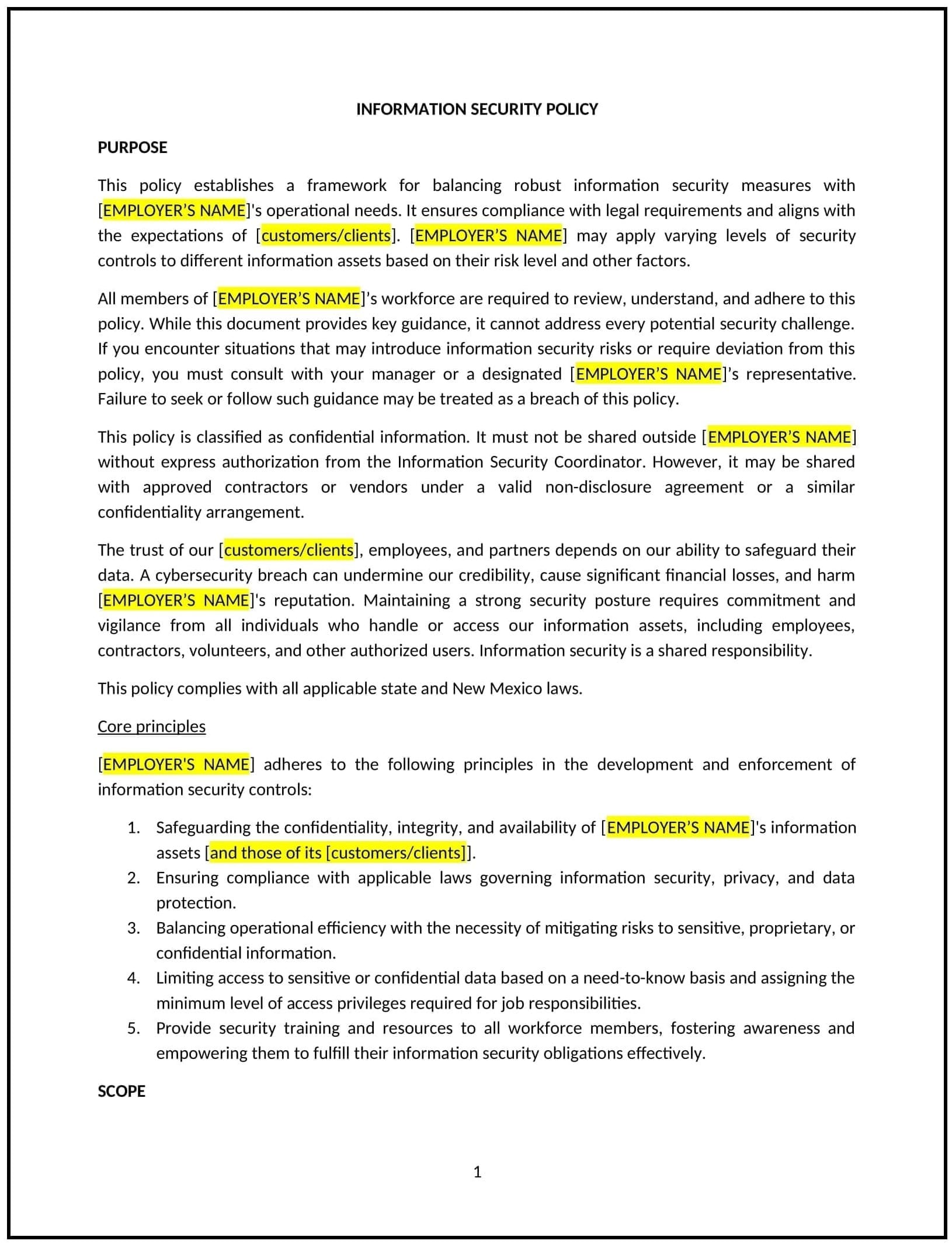Information security policy (New Mexico): Free template
Got contracts to review? While you're here for policies, let Cobrief make contract review effortless—start your free review now.

Customize this template for free
Information security policy (New Mexico)
This information security policy is designed to help New Mexico businesses protect sensitive company data, employee information, and customer data from unauthorized access, breaches, and other security risks. The policy outlines best practices, security protocols, and the steps the business will take to maintain the confidentiality, integrity, and availability of critical information.
By adopting this policy, New Mexico businesses can safeguard their data, maintain customer trust, and reduce the risk of security incidents that could damage their reputation or result in legal penalties.
How to use this information security policy (New Mexico)
- Define information security objectives: Clearly state the company’s commitment to securing data, including personal, financial, and proprietary information. Explain why information security is vital to the company’s operations and compliance with New Mexico and federal regulations.
- Identify and classify sensitive information: Outline what constitutes sensitive data within the organization, such as customer information, financial records, intellectual property, and employee data. Classify data based on its sensitivity level and outline the appropriate handling procedures for each category.
- Set access controls: Specify who has access to different types of information, based on roles and responsibilities. Use the principle of least privilege to limit access to sensitive data and establish secure login procedures, including multi-factor authentication.
- Implement security protocols: Provide clear guidelines for securing company data, such as encryption, data backups, secure communication channels, and anti-malware software. Outline how data should be stored, transmitted, and disposed of to minimize exposure to unauthorized access.
- Reflect New Mexico-specific considerations: Address any state-specific information security regulations or data protection laws in New Mexico, including any reporting requirements for data breaches or guidelines for handling state-specific data.
Benefits of using this information security policy (New Mexico)
Implementing this policy provides New Mexico businesses with several advantages:
- Protects company and customer data: A robust information security policy ensures that sensitive business and customer data is kept safe from cyber threats, reducing the risk of breaches or data leaks.
- Enhances regulatory compliance: The policy helps businesses comply with New Mexico state laws, federal data protection laws (such as HIPAA or CCPA), and industry-specific regulations related to data privacy and security.
- Builds customer trust: By demonstrating a commitment to securing customer data, businesses can build and maintain trust with their customers, enhancing customer loyalty and satisfaction.
- Reduces legal and financial risks: Implementing security protocols helps businesses avoid costly data breaches, fines, and lawsuits that could result from inadequate data protection practices.
- Improves operational efficiency: Strong security measures ensure that critical information is protected, which helps prevent disruptions in business operations and protects the integrity of business processes.
Tips for using this information security policy (New Mexico)
- Communicate the policy clearly: Ensure that all employees understand the information security policy, their responsibilities in protecting company data, and the consequences for failing to follow the policy. Include the policy in the employee handbook and provide regular training on security best practices.
- Use technology to enforce security: Implement the use of firewalls, encryption, anti-virus software, and other tools that help secure sensitive data. Ensure that these tools are regularly updated to protect against evolving cyber threats.
- Monitor data access: Regularly audit and review who has access to sensitive data to ensure that access rights are appropriate for employees’ roles. Revoke access immediately when an employee leaves the company or changes roles.
- Educate employees about phishing and social engineering: Offer training on how to recognize phishing attempts, social engineering tactics, and other cybersecurity threats to reduce the risk of employees accidentally exposing company data.
- Review the policy regularly: Periodically review and update the information security policy to ensure it aligns with changes in technology, new security threats, and evolving state and federal regulations in New Mexico.